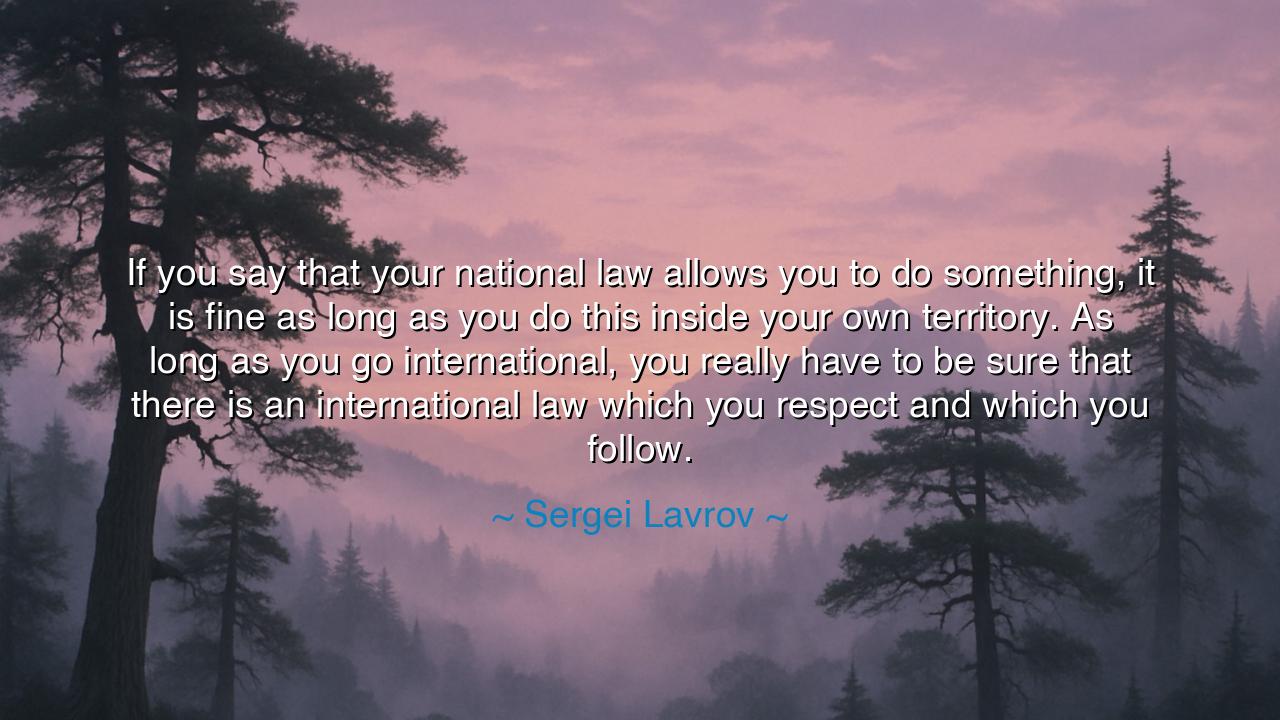
If you say that your national law allows you to do something, it
If you say that your national law allows you to do something, it is fine as long as you do this inside your own territory. As long as you go international, you really have to be sure that there is an international law which you respect and which you follow.






Hear, O seekers of wisdom, the words of Sergei Lavrov, who proclaimed: “If you say that your national law allows you to do something, it is fine as long as you do this inside your own territory. As long as you go international, you really have to be sure that there is an international law which you respect and which you follow.” In this utterance lies a principle as old as civilization itself: that the rule which binds one household may suffice within its walls, but when one steps beyond, into the marketplace of nations, greater laws and higher bonds must be observed.
The meaning of this teaching is clear. Within your own borders, the people may live by the laws they have made for themselves, rules shaped by custom, culture, and consent. But once a nation steps into the wider world—whether in trade, diplomacy, or conflict—it cannot walk by its own code alone. It must bow to international law, the covenant of nations, lest chaos and tyranny consume the earth. For no people is an island entire of itself; the actions of one ripple outward, touching the fates of many. Respecting shared law is the only way peace may endure.
The origin of this wisdom is found in the long, tragic story of human conflict. For centuries, nations claimed the right to act as they pleased beyond their borders. Empires marched, declaring their laws sufficient to enslave and conquer. Yet blood and ruin followed. Only after wars of fire and steel did humanity begin to build common covenants—treaties, charters, councils—seeking to bind power with justice. Lavrov’s words arise from this legacy, a recognition that when nations meet, they must be governed not by pride alone, but by the law of all.
History offers us examples both noble and dire. Consider the Treaty of Westphalia in 1648, which ended the Thirty Years’ War. Europe, long torn by bloodshed, agreed at last to respect the sovereignty of nations, laying the foundation for modern international law. Here, respect for shared rules became the safeguard of peace. Yet contrast this with the tragedies of the 20th century, when powers defied international norms, seizing lands and ignoring treaties. The world was plunged into world war, and only at great cost did nations reaffirm the necessity of institutions like the United Nations. From these tales, we learn that respect for international law is not weakness but survival.
The emotional force of Lavrov’s words lies in their humility. He acknowledges that no nation, however mighty, can claim the right to impose its will without restraint. Pride may declare, “Our law is enough,” but wisdom answers, “Our law must live alongside others.” This humility is not surrender, but strength, for it recognizes that harmony among nations requires restraint, dialogue, and shared respect. To ignore this truth is to invite endless strife.
The lesson for us, though spoken of nations, applies also to individuals. In your own home, you may live as you wish, but when you step into the world of others, you must honor the rules that preserve peace. Respect in community, respect in friendship, respect in the marketplace—these are the foundations of harmony. Just as nations must abide by international law, so too must individuals abide by the shared bonds of their societies, lest pride lead them into ruin.
Therefore, let your actions be guided by this wisdom. If you lead, ensure that your nation acts not only with power, but with respect for the agreements of the world. If you are a citizen, honor both your own traditions and the shared laws of humanity. Seek dialogue before conflict, cooperation before conquest, and respect before pride. For only in such balance can the world be made stable.
And so, remember the teaching of Sergei Lavrov: national law governs your house, but international law governs the world we share. To honor it is to preserve peace; to scorn it is to summon destruction. Walk then with humility and reverence, for the laws that bind us together are the fragile threads upon which civilization itself hangs.






AAdministratorAdministrator
Welcome, honored guests. Please leave a comment, we will respond soon